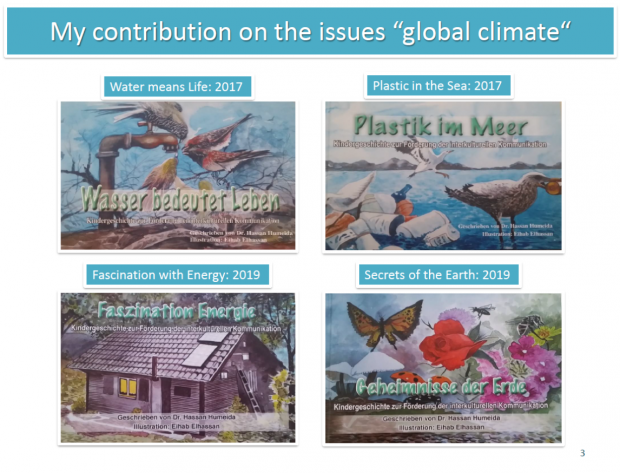Global Moment for Earth: Media should dedicate daily time slots exclusively to climate change

By Dr. Hassan Humeida
Kiel, Germany
KIEL: Climate change is not a new phenomenon. Described as the cooling or warming of the Eart’s climate over a long period of time, it is considered the most important problem on planet Earth.
For the last decades, a climate crisis that affects the entire earth system has been recognized. While this problem has received major attention worldwide, it has temporarily been put on hold by the global Corona pandemic.
The problem with climate change in the Anthropocene, a period where climate change is caused the human population, is now on the back-burner as all news headlines currently cover the Corona crisis.
However, the climate change issue needs recognition, awareness and responsible action. Here, the contribution of every human being counts in different forms, such as housing, mobility, lifestyle such as consumption behaviour.
All people on the globe must be aware that nature cannot be taken for granted any longer and, if ignored, will strike back like a wave with full force. More and more unfavourable effects on earth are being triggered by the greenhouse gases.
Destruction of the earth’s layers in search of mineral resources has restricted more and more habitats for various organisms. We need not be surprised when the first signs of climate change result in the form of global warming, glacier melt, rising sea levels and flooding. Extreme heat and forest fires occur regularly in various regions on earth, where billions of living beings are at threat.
Desertification and water shortages render many regions uninhabitable for living beings. In addition, and in consequence, insect infestations and plagues destroy important green belts, leading to extreme hunger and poverty.
Climate change is hitting the poor and marginalised groups of people particularly hard. Here, the working population as daily wage earners in agriculture, animal husbandry and fisheries are primarily threatened.
Ever increasing temperatures are associated with extreme weather phenomena. Here it is expected that hurricanes in coastal areas, floods and salinisation of the soils will occur. It is also expected that with further temperature increases, some island nations will disappear forever because of increase in sea-level rise.
From an agricultural perspective, cultivation for certain produces may shift or biodiversity may be severely affected and certain plant species may disappear forever.
The problem is exacerbated by an increase in the world’s population by 2050, when 9.63 billion people are expected to live on Earth, all of whom will need space to live, eat, drink and move around.
In addition, there is an ageing population on several continents, which means that these groups will need to be cared for and looked after.
The Corona crisis can also be seen as a consequence of climate change. We live in times of warmer average temperatures worldwide. This makes the growth of microorganisms, among them many pathogens, possible. Their conditions are favoured even more so by human population growth, intensive global travels and many people and animals living in confined spaces.
It has been about 200 years since the first vaccinations by Robert Koch (tuberculosis vaccine) and Luis Pasteur (rabies vaccine), but also almost 100 years since the development of the first antibiotics by Alexander Fleming (penicillin), which are major milestones in the fight against infectious diseases.
Another complex issue is the emergence of multi-drug resistances, resulting in diseases for which there is no cure.
We are still in the early stages of learning how to combat microbial pathogens and noting that the pathogen profile has changed from microbes to viruses. While the Corona pandemic has brought the world to a near stand-still, the climate issue is not going away and may cause even bigger consequences if unattended in the long run.
Journalism is an important and responsible profession that plays a significant role in the communication about climate change. Journalistic work is neutral, transparent and independent. Journalism can prioritize the climate issue, bring climate change into focus and write about climate in a facts-driven manner. Journalism should not get into conflicts of interest, be they political, economic or otherwise.
The close monitoring of scientific work in the matter of climate change should be the overarching goal. Journalism should also not forget the climate activists and their effective roles in society. People, young and old, who dedicate their time to a highly important issue like climate change should be recognised, honored and respected.
To help solve this global problem I suggest that there could be a specific time slot where each country would cover the daily news exclusively on climate change so that the global population always receives up to date information.
This event, tentatively called “The Global Moment” for one planet will help raise attention to the fact that climate change can only be solved if the world unites.
Such a daily report could be presented by listening, watching or reading – a literacy method that can motivate and bring people worldwide to the right action.
In the end, journalism is about telling the truth about climate change. We have to communicate this in a fair and transparent manner. In this way, we can guarantee that young and future generations act in a climate-conscious way and take responsibility for their future.

























































